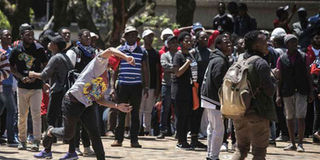Student protests an indicator of wider changes in politics and economies

A student from the University of Witwatersrand in Johannesburg, South Africa throws stones towards private security guards during clashes in the city following a protest for free higher education on October 10, 2016. PHOTO | GIANLUIGI GUERCIA | AFP
What you need to know:
Students are protesting because they have been robbed of old big matters.
- Some issues will have been solved and for others, because increasing sophistication of our societies, it means there are other groups that have arisen to champion them.
All they are left with is to agitate for a hump outside the university gate or to protest because the beans they were served for dinner had a little too many weevils.
The big news about African universities has lately been focused on South Africa, where long-running #FeesMustFall protests got nasty as students burnt buildings and fought running battles with police.
The students there truly upped the ante, deploying an unusual weapon — they offloaded sewage in classrooms and corridors, ensuring that classes could not resume.
As is the custom, the rumblings have started at universities elsewhere in Africa again after a short break, the latest in Kenya being Maseno, where students rioted after a villager allegedly killed a colleague. These days, there tends to be criticism of university activism as “inward looking”. That they are too focused on allowances, food, fees, a student run over by a car or attacked, exam results withheld over non-payment of fees, and so forth.
The argument goes that in the old golden age, students were truly revolutionary, fighting against dictatorship, opposing imperialism, joining workers in solidarity for better wages, and even backing young officers toppling corrupt one-party dictatorships.
The old revolutionaries are puzzled and disappointed that university students should strike, and be sent home, because they were served bad ugali.
But all this misses the fact that student protests are an indicator of wider changes in our politics and economies.
First, most of Africa has deindustrialised. The big textile, steel, and other factories in Nairobi, Nakuru, Kisumu, and places like Eldoret are long dead. The class of unionised workers who had “nothing to lose but their chains” has dwindled.
REVOLUTIONARY CLASSES
The majority of workers in the dominant white collar and service jobs sectors do not unionise. So, to start with, there are no longer revolutionary classes for students to ally with, even if they wanted to. It is not necessarily true that they are less politically conscious or not engaged with the wider social issues.
Secondly, the nature of student protests today tells us that several of the problems the old militants used to fight over have been solved. For example, most universities elect their leaders freely. The students also vote in sometimes-free and fair national elections for the president and Parliament.
There are still dictators around, yes, but they are elected and therefore have their supporters. Students, therefore, are more likely to get an opportunity to present a petition to Parliament or to vent their grievances in the media and on Facebook or Twitter, and go to bed feeling that they have been heard.
So the advance of democracy, though it be patchy, has taken the sting out of old-school student activism.
Universities have also lost the bargaining power that comes with exclusivity. A few years ago, even a half-drunk bloke could name the two or three universities in Kenya. The same was true in other African countries. Today, not even the Cabinet secretary for Education can list the many Kenyan universities off the top of his head. He would have to read them off a list.
When there were one or two universities, a strike was a national crisis. But when there are dozens of them and a university graduate cannot even get a job as a messenger, their strikes no longer send chills down the back of the State.
FAR-REACHING CHANGE
But perhaps the most far-reaching change has been the growth of civil society and the non-governmental (NGO) sector. Hearing critics speak, there are probably as many NGOs in Kenya as there are students. Many students are also one-man or one-woman (briefcase) NGOs in their own right, ranging from those dedicated to saving local trees to some working to preserve local languages and culture.
Students have, therefore, been crowded out of both the grievance and activism marketplaces. These days, for example, if they want to rage against corruption in some public institution, they will probably join a protest organised by a coalition of NGOs — who are better at doing sleek campaigns and posters — than organise their own thing.
Therefore, when students take to the streets over “small” issues it might help to approach their actions with a sense of history. They are doing so because they have been robbed of the old big matters. Some of the issues will have been solved and for others, because the increasing sophistication of our societies, it means there are other groups that have arisen to champion them.
All they are left with is to agitate for a hump outside the university gate or to protest because the beans they were served for dinner had a little too many weevils. We should be thankful for small problems.
Charles Onyango-Obbo is publisher, Africapedia.com and Roguechiefs.com; Twitter: @cobbo3





